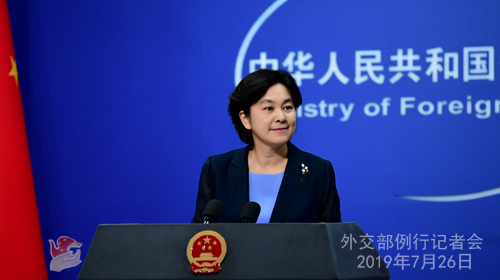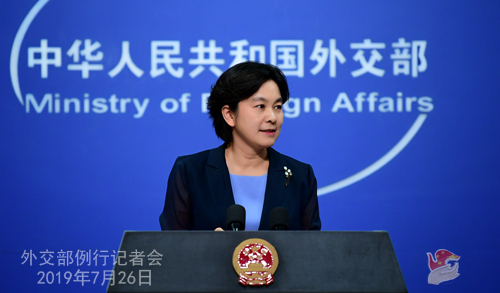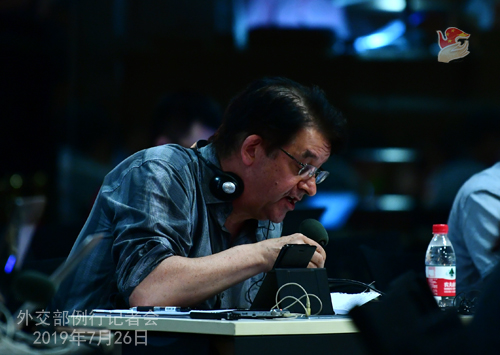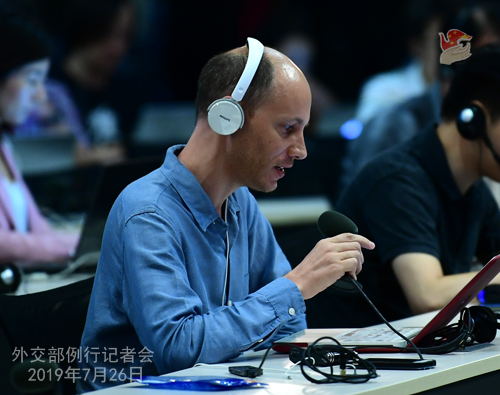| Foreign Ministry Spokesperson Hua Chunying's Regular Press Conference on July 26, 2019 |
| 2019-07-26 21:24 |
|
At the invitation of the government of the Federated States of Micronesia, Yang Chuantang, President Xi Jinping's Special Envoy and Vice Chairman of the National Committee of the Chinese People's Political Consultative Conference (CPPCC) will attend President Panuelo's inauguration ceremony in the FSM at the end of July. Q: China and the Philippines held the 22nd diplomatic consultation in Manila on July 23. Can you share with us the outcomes and highlights? What consensus has been reached? A: China and the Philippines held the 22nd China-Philippines diplomatic consultation in Manila on July 23. This is the first diplomatic consultation between the two sides after we elevated the China-Philippines relations to a comprehensive strategic cooperative relationship. The two sides fully exchanged views on bilateral relations, cooperation in various fields and international and regional issues and reached a series of important consensus on our commitment to three general directions. First, we stay committed the general direction of China-Philippines good neighborliness. Both agree that since the China-Philippines relationship turned around in 2016, the two sides have renewed our friendship, properly managed differences and expanded cooperation, which has promoted our common development and injected positive energy to regional development and prosperity. The two sides stress that we will unswervingly adhere to good neighborliness and continue to deepen our cooperation under the Belt and Road Initiative and be each other's good neighbor, good friend and good partner forever. Second, we stay committed to the general direction of peace and stability in the South China Sea. The two sides believe that with the concerted efforts of China, the Philippines and other countries in the region, the situation in the South China Sea has been stabilized in general, with growing momentum for cooperation and increasing positive factors. The two sides have decided to hold the fifth meeting of the China-Philippines Bilateral Consultation Mechanism (BCM) on the South China Sea to manage and control maritime situation and step forward for joint development. As co-chairs of the Senior Officials' Meeting on the Implementation of the Declaration on the Conduct of Parties in the South China Sea (DOC), China and the Philippines will join hands to advance the consultations on the Code of Conduct in the South China Sea (COC). Third, we stay committed to the general direction of regional cooperation and development. China upholds ASEAN centrality in regional cooperation and supports the Philippines in fulfilling its duty as the coordinator for China-ASEAN relations. The two sides stressed that we will work together to ensure the success of the series of meetings on East Asia cooperation and grasp the priority and direction for regional cooperation. In particular, we should strengthen the synergy between the Belt and Road Initiative and the Master Plan on ASEAN Connectivity 2025 (MPAC 2025), advance cooperation in media, smart city and digital economy, build a higher-level China-ASEAN strategic partnership and inject new vitality into East Asia cooperation.
Q: When speaking of Beijing possibly sending the PLA to Hong Kong in his interview with Bloomberg Television yesterday, US Secretary of State Mike Pompeo said that he hoped the protests will remain peaceful and avoid violence. He also quoted President Trump's words that the US hopes China to do the right thing. What's your response? A: We noted recent remarks by Pompeo and others on the PLA Hong Kong garrison. The spokesperson of the National Defense Ministry has made clear remarks on the PLA Hong Kong garrison fulfilling its duty in accordance with law. I would like to stress that since the return of Hong Kong, the PLA Hong Kong garrison has strictly abided by the Hong Kong Basic Law and the Garrison Law and faithfully fulfilled their defense duties. It has become an anchor for long-term prosperity and stability in Hong Kong. Follow-up: Since Mike Pompeo said the US hopes China to "do the right thing", what do you think is "the right thing"? A: I believe I already made it clear the other day. The central government has been doing the right thing all along for the long-term stability and prosperity of Hong Kong. We hope the US will also do the right thing. Q: The relaunch ceremony of the East Coast Rail Link (ECRL) project was held on July 25 in Terengganu, Malaysia. Malaysian Transport Minister Anthony Loke and Chinese Ambassador to Malaysia Bai Tian attended the ceremony. I wonder if you have any comment? A: We welcome the relaunch of this project. We would like to work with Malaysia in its construction to help the economic and social development of the region and bring benefits to local people. This case shows again that it's not fearful if problems and challenges arise in the BRI cooperation and other cooperation programs. As long as both sides have a constructive attitude and vision for development, and engage in friendly consultation in the spirit of mutual understanding and accommodation, we can always overcome difficulties and achieve win-win cooperation. Q: Tunisian President Essebsi died of illness on July 25. I wonder if you have any comment? A: President Essebsi was a leader deeply loved by his people. He played an important role in Tunisia's national transformation, reform and steady development. He also made positive contributions to China-Tunisia friendly cooperation. We are deeply saddened by and mourning his passing.
Q: The Civil Human Rights Front sent letters to 61 consulates-general and foreign offices in Hong Kong, urging them to issue travel alerts to their citizens on Hong Kong. This has been strongly condemned by people in Hong Kong, who called it a self-orchestrated and self-performed drama by the Civil Human Rights Front to undermine the rule of law in Hong Kong. Those who in the tourism industry warned that it's easy to damage Hong Kong's image but hard to rebuild it, urging the organization to stop doing so immediately. Does the foreign ministry have any response to that? A: Since the return of Hong Kong 22 years ago, with the full support of the central government, Hong Kong has maintained prosperity and development. This "Pearl of the Orient" has shined brightly and been the pride of all Chinese people, including the over seven million Hong Kong compatriots. However, the radical, violent and illegal activities plotted and organized by a very small number of people recently have seriously affected the foundation of the rule of law in Hong Kong, undermined the security, stability and order there and damaged Hong Kong's image. This is heartbreaking and strongly condemned by people in Hong Kong. You mentioned some people asking foreign countries to issue travel alerts on Hong Kong. I believe you have seen clearly the nature of this act. This is an attempt to pressure the central and the SAR governments by inciting foreign forces to interfere in Hong Kong affairs. Like we said, Hong Kong is China's Hong Kong, which allows no interference from foreign forces in any form. I would like to advise those who try to bring a wolf into the house to harm the country and the people to carefully study the history. Has anyone in history met a good end after colluding with external forces and bringing damage to their own country and people? Q: After FedEx misrouted parcels from Huawei, this morning China accused FedEx of deliberately holding up delivery of more than 100 Huawei packages. What would be the consequences of that? A: I note media reports on that. Recently the relevant authority in China conducted investigations on the case where FedEx China misrouted parcels. The investigations found that FedEx's claim of "operational errors" for transferring Huawei packages to the US is simply not true. They also found that FedEx is suspected of holding up over 100 packages addressed to Huawei. Clues to other violations have also been discovered by the investigators. The relevant authority will continue to conduct in-depth investigations into this in a comprehensive, objective and fair manner. The consequences you asked about will depend on the investigation results. Q: The second round of China-ROK intergovernmental negotiations on maritime demarcation was held in Beijing yesterday. Can you tell us something about the outcomes? On July 25, Vice Foreign Minister Luo Zhaohui and the ROK Second Vice Foreign Minister Lee Taeho co-chaired the second round of China-ROK intergovernmental negotiations on maritime demarcation in Beijing. Both sides confirmed the relevant consensus made after the negotiations started and exchanged views on demarcation issues. Both believe that settling the maritime demarcation issues through friendly consultation is important to the stable development of bilateral relationship in the long run, greater maritime cooperation and China-ROK strategic cooperative partnership going forward. Q: Will Beijing Automotive Industry Holding Co., Ltd. (BAIC) push for a board seat on Germany's Daimler after it bought a 5-percent stake? That stake has taken China's overall stake to almost 15 percent, which makes it the largest investor holding. Might China's ambition be to turn it into a national Chinese champion, perhaps? A: I'm not aware of that.
|
 |
|



